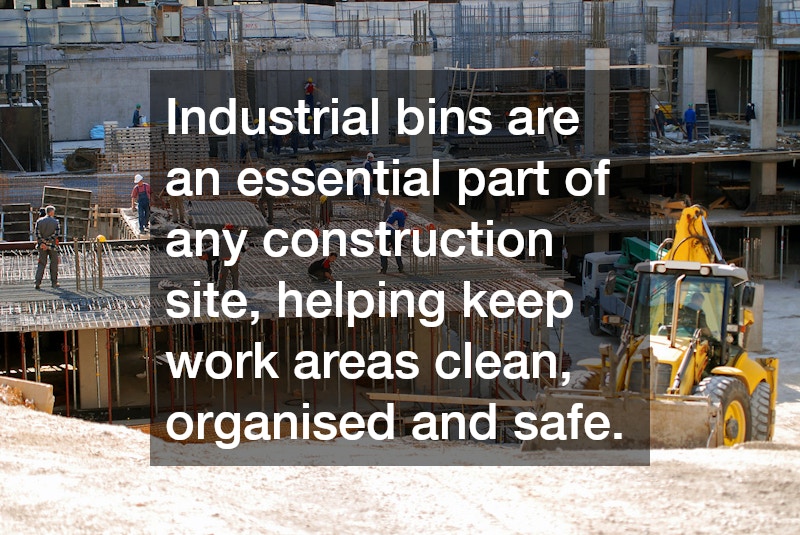Industrial bins play a crucial role in keeping construction sites organised, efficient and safe. With so much waste generated during building, demolition and renovation projects, having the right bins on site is not just a convenience—it’s a necessity.
A well-managed site relies on proper waste disposal to ensure work progresses without disruption. From offcuts and concrete to packaging and hazardous materials, industrial bins help manage large volumes of waste while supporting environmental standards and safety protocols.
Keeping the site clean and safe
Construction zones are full of activity, and without a reliable waste system, rubbish can pile up quickly. Loose debris and discarded materials create tripping hazards, block access points, and make it harder for workers to do their jobs efficiently.
Industrial bins give tradespeople a clear and centralised location for disposing of waste. This reduces clutter, improves visibility across the site and minimises risks caused by scattered rubbish. When everyone knows where to discard their materials, it’s easier to maintain a safe working environment.
Keeping a site clean isn’t just about appearance—it directly impacts worker safety and the ability to meet project timelines.
Managing different types of waste
Not all construction waste is the same. Different materials require different handling methods, and industrial bins help streamline the process. Timber, metal, brick, plasterboard and green waste can be separated into dedicated bins for more efficient disposal and recycling.
Some projects also generate hazardous waste like asbestos, paints or chemicals, which must be disposed of in compliance with local regulations. Using clearly labelled bins ensures dangerous materials are not mixed with general rubbish and helps protect workers from exposure.
Proper segregation also makes it easier for waste management companies to sort and process materials off-site, supporting sustainability goals and reducing landfill use.
Meeting legal and environmental standards
Australian construction sites must follow strict rules regarding waste disposal. Councils and environmental agencies require builders and developers to manage rubbish responsibly and minimise environmental impact wherever possible.
Using industrial bins is a straightforward way to comply with these requirements. Most bin hire providers offer a range of sizes and waste types, along with documentation to prove your site is following correct disposal methods.
This helps protect your business from fines or penalties and supports your company’s commitment to sustainable building practices. It also reflects well with clients who prioritise environmental responsibility.
Improving workflow and project efficiency
Time is one of the most valuable resources on any construction site. When waste is handled correctly, workers can move around freely, deliveries can be made without delay and tasks can be completed without unnecessary interruptions.
Industrial bins support this workflow by ensuring that rubbish doesn’t become an obstacle. With bins located in convenient areas around the site, trades can dispose of waste quickly and return to their tasks without walking across the job site or waiting for clean-up crews.
This streamlined process helps reduce downtime and keeps the project on track, especially during busy stages like framing, roofing or demolition.
Protecting nearby areas and communities
Construction work often takes place near homes, businesses or public spaces. When waste is not contained, it can spill beyond the site and affect nearby footpaths, roads and properties. Wind and rain can carry loose debris into stormwater drains or neighbouring yards, leading to complaints and extra cleanup costs.
Industrial bins prevent this by containing rubbish in secure, enclosed containers that won’t overflow or scatter. Many bins come with lockable lids or covers to keep waste in place and deter illegal dumping after hours.
A tidy and well-maintained site reduces environmental impact and helps maintain a positive reputation with neighbours and the broader community.
Supporting large-scale or long-term projects
Some construction jobs last for months or even years and require a reliable waste management system that can grow with the project. Industrial bins come in various sizes to match the scale of your work, from small residential builds to multi-storey developments.
Larger bins can handle heavy waste like concrete or bricks, while smaller bins are ideal for lighter materials. Depending on the stage of your project, you can adjust the type and number of bins needed to match the current workload.
This flexibility ensures that your waste solution evolves alongside your construction schedule, without requiring a major overhaul every few weeks.
Choosing the right bin provider
Not all bin hire services offer the same level of support. A good provider will assess your project, recommend suitable bin sizes and offer prompt drop-off and collection to suit your schedule. Some even provide same-day service or regular rotation to keep waste under control.
This partnership helps you stay focused on the build while knowing that waste management is being handled professionally and in line with regulations.
Industrial bins are an essential part of any construction site, helping keep work areas clean, organised and safe. They support better waste management, protect workers and reduce the risk of environmental harm. Most importantly, they contribute to a smooth workflow and allow your team to focus on getting the job done.
Whether you’re managing a small renovation or a large commercial build, the right bin setup makes a significant difference. Investing in proper waste solutions isn’t just a smart move—it’s a necessary step toward building responsibly and efficiently.


